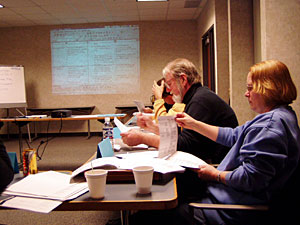|
Audio
Photos
More from MPR
Your Voice
|
Revised social studies standards might not satisfy critics
December 4, 2003
 |
| At a recent meeting, members of the social studies standards writing committee reviewed their new proposal for geography. (MPR Photo/Tim Pugmire) |
St. Paul, Minn. — Members of the social studies standards writing committee reviewed their new proposal for geography at a recent meeting. The same panel of teachers and parents is also revising the grade-by-grade expectations for students in civics and government, economics and history.
State Education Commissioner Cheri Pierson Yecke says the committee has been trying to condense the standards based on the public input her agency gathered.
"When we put the original documents out in October, we instructed committee members if in doubt, don't take it out," Yecke said. "Have a very lengthy document so then the public can decide what are our priorities? Which way should we go in terms of molding and streamlining this document for a final product?"
 | |||
Yecke says committee members have narrowed the list of names, places and events in the history standards by moving some from the "benchmark" column of items students will be required to learn to a new optional list of "examples." She says some of the names left out of the first draft have been added in the rewrite.
"The Cuban missle crisis and the Bay of Pigs, both of those incidents appeared in the original standards," Yecke said. But the name John F. Kennedy did not. So, that was an omission that had to be addressed."
Yecke says the new knowledge-based standards will still add some much needed weight to classroom requirements. She says the previous expectations of the Profile of Learning standards, which stressed process over facts, were especially thin in the area of social studies.
Opponents of the new standards aren't impressed. Paul Spies, a founder of Minnesotans Against Proposed Social Studies Standards, says the initial document was full of problems, and he fears many will remain.
"(I) saw them as very age-inappropriate, saw them as politically and ideologically biased and very culturally biased toward a white, European perspective," Spies said. "Didn't see that they were balanced and I also saw that they would be very cumbersome for teachers and for students."
 | |||
Spies says the standards will emphasize rote memorization rather than critical thinking. But supporters of the fact-heavy approach strongly disagree.
Julie Quist, director of EdWatch/Maple River Coalition, a group that fought for the repeal of the Profile standards, says a knowledge-based system is important.
"Knowledge is not useless," Quist said. "It is very valuable for the building blocks of being able to do critical thinking. You can't bring students into a classroom and teach them critical thinking until you have a body of knowledge that they can think about."
Quist says that knowledge must also include the basic principals of American democracy. She's concerned the patriotic content might get watered down in the second draft. Commissioner Yecke, however, says she too wants standards that look at the greatness of America.
"Has our history been perfect? No," Yecke said. "There have been incidents in our history that are shameful, but does that mean we should be ashamed of our country? Absolutely not. We nee to support this country. People need to know that this is the best place on the earth to live."
But a key state lawmaker says he has concerns about the view of America he's seen in the proposed standards. Sen. Steve Kelley, DFL-Hopkins, chairman of the Senate Education Policy Committee, says he thinks the civics and government standards reflect a particular ideological viewpoint.
"There's an over emphasis on the Declaration of Independence, and some just factually wrong kind of things contained in there that seems to reflect a viewpoint on the country's founding that I don't know reflects the scholarly consensus or a mainstream viewpoint," Kelley said.
Kelley plans to hold a committee hearing on the proposed standards sometime in January, before the start of the 2004 session.
|
News Headlines
|
Related Subjects
|
